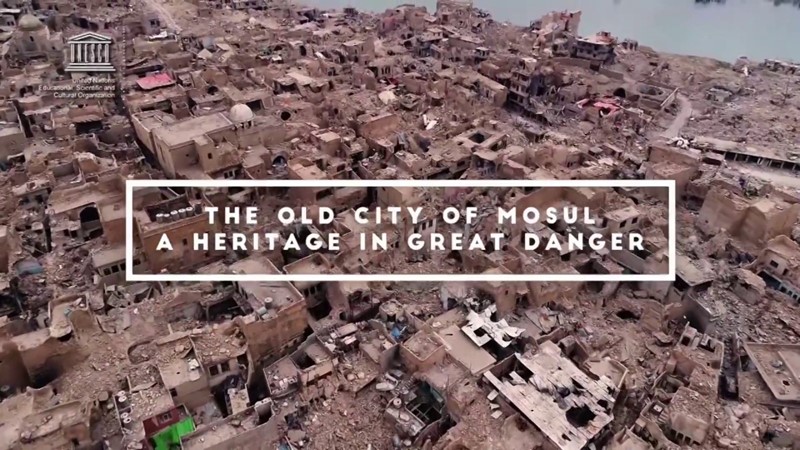
Yesterday, 21 July marked the third anniversary of the liberation of the Iraqi city of Mosul from occupation by Da'esh. On 21st July 2017, The city finally threw off the shackles of violent extremism, putting an end to 36 months of destruction and violence. Just over a year later, in 2018, UNESCO launched the initiative 'Revive the Spirit of Mosul', to help Moslawis to reclaim their city through culture and education.
Prior to The Islamic State in Iraq and the Levant’s (ISIL) invasion in 2014, Mosul was one of the most pluralistic and tolerant cities in the Middle East. Its name means ‘crossroads’ and, as a place where ancient trade routes converged, it had been home for centuries to people from a diverse patchwork of ethnicities, religions and sects.
Cultural Heritage: 80 % of the Old City of Mosul was destroyed in the Battle of Mosul - the biggest urban battle since those of World War 2. The bombing laid waste to centuries-old mosques and churches. Reconstruction is a painstaking process. But UNESCO is already working with architects and heritage experts to rebuild important architectural landmarks such as the Al-Nouri mosque, the Al-Habdah Minaret, the Al-Tahera and Al-Saa'a churches, with funding from the United Arab Emirates and Al Aghawat Mosque with funding from the Government of Germany
UNESCO is also working on the reconstruction of the historic urban fabric: this project, funded by the European Union, aims to restore around 200 houses in the old towns of Mosul and Basra.
These projects aim to create jobs and strengthen the capacities of the workforce and craftsmen, technical training for the trades of architectural restoration.
Cultural Life: Music was banned for three years under the occuation of Da'esh. With its partner, Action for Hope, UNESCO is working on reviving music in Mosul. The programme is part of a project entitled “Listening to Iraq”, that seeks to empower vulnerable populations by celebrating cultural diversity and strengthening social cohesion.
The revitalization of cultural industries, support for the art world, artists' networks, media, and cultural tourism can be powerful accelerators of economic growth and job creation. UNESCO supports initiatives and organizations that contribute to the societal and cultural development of Mosul.
In addition, we also support the academic world in need of resources (libraries) by facilitating their access to new technologies. Music was banned for three years under the occuation of Da'esh. With its partner, Action for Hope, UNESCO is working on reviving music in Mosul. The programme is part of a project entitled “Listening to Iraq”, that seeks to empower vulnerable populations by celebrating cultural diversity and strengthening social cohesion.
The first cultural book festival was organized in autumn 2019 in Mosul with the support of UNESCO, entitled "Culture from Ashes".
Education : In the aftermath of the occupation, Mosul is highly fertile ground for violent extremist recruitment; children and young people are the most at risk. With the Netherlands, UNESCO is working to prevent the spread of violent extremism through training of primary school teachers. To date, 26 trainers, 743 primary school teachers and managers, and 307 parents have completed UNESCO’s Prevention of Violent Extremism through Education training. This project, funded by the Governments of the Netherlands and Japan, is based on a holistic approach that involves children, teachers, communities, parents and educational staff in the prevention of extremism.UNESCO is ensuring a safe learning environment for every child. UNESCO is working to rebuild schoolsand empower teachers in their vital role of facilitating a rapprochement of the different sectors of the community.
UNESCO has just released this film marking the anniversary of the liberation. It shows how our efforts to regenerate the city touch the lives of it's people. Three years after its liberation, Mosul is on the rise.


